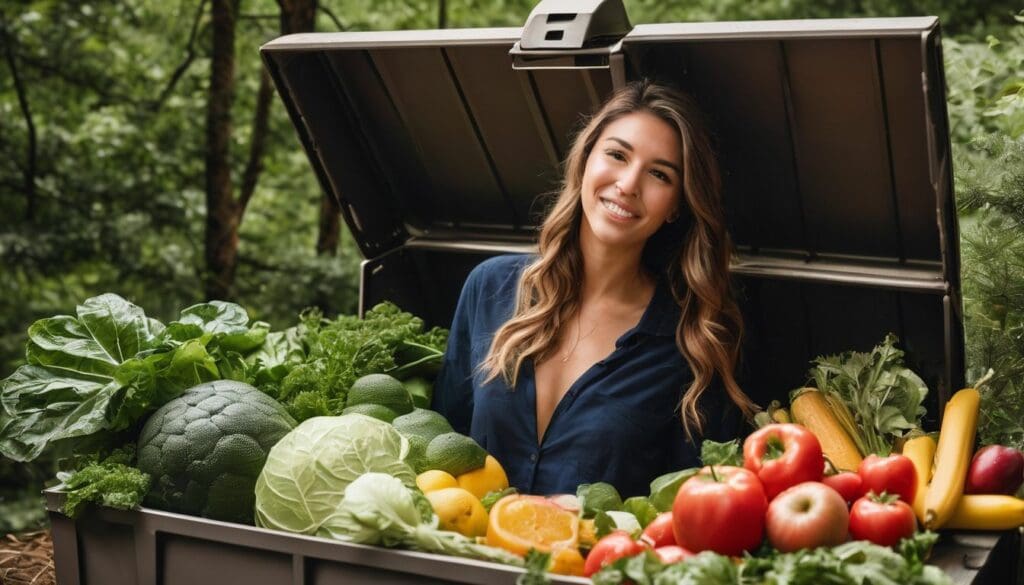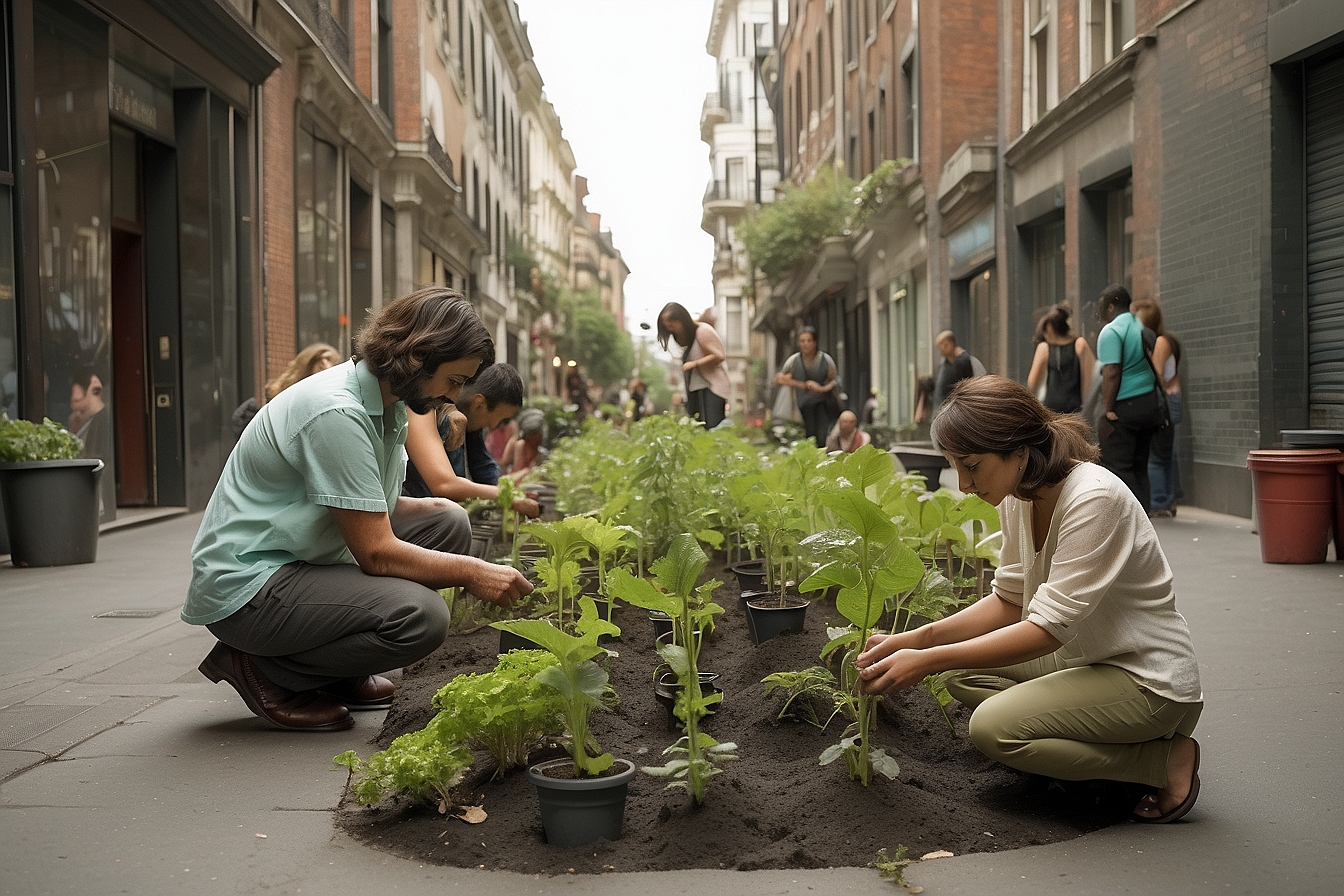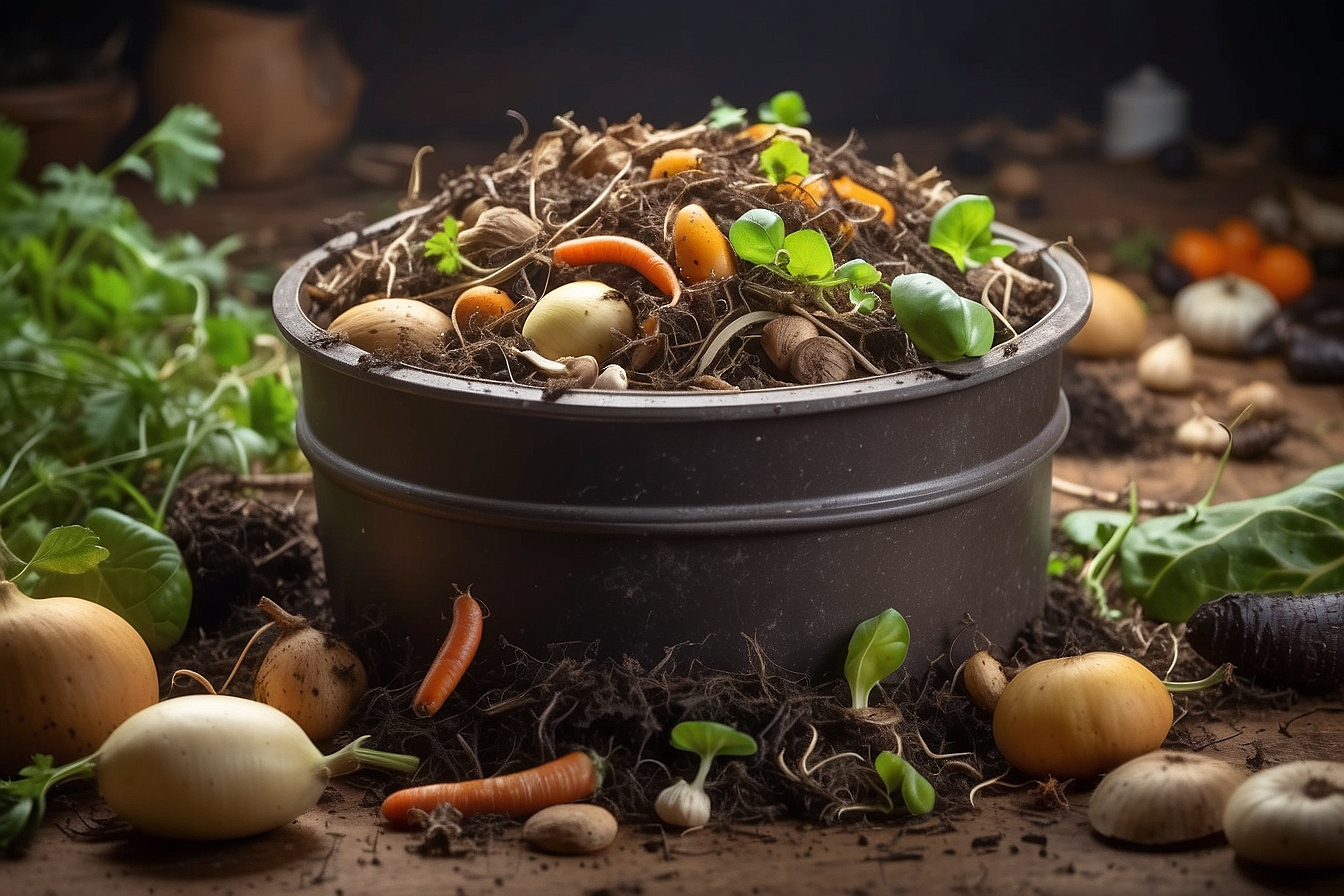Ever noticed how your kitchen bin tends to fill up faster than a flash? It’s something many of us encounter and, quite frankly, it can feel rather daunting. Astoundingly, the typical household chucks out nearly 30% of their foodstuffs.
But don’t fret—we’re coming to the rescue! After diving headfirst into stacks of research, we’ve unearthed some straightforward strategies that’ll truly make an impact. Get ready to uncover savvy tips that will cut down on waste and help your kitchen turn over a new leaf towards sustainability.
Shall we crack on?.
Key Takeaways
- Plan meals and use proper storage to minimise food waste, ensuring we purchase only what is necessary and extending the shelf life of our groceries.
- Refuse single – use plastics by choosing reusable alternatives like beeswax wraps, glass containers, and silicone bags which help cut down landfill waste.
- Swap out harmful chemical cleaning products for natural, eco-friendly options to protect both the environment and our health from pollution.
- Buying in bulk reduces excessive packaging waste, saves money, and allows us to control portion sizes to prevent unused food from spoiling.
- Support local farmers by purchasing seasonal produce directly from them; adopt a vegan lifestyle to further reduce the environmental impact of our diets.
The Impact of Kitchen Waste on the Environment
Food waste, plastic waste, and pollution from chemicals in cleaning products all have a detrimental impact on the environment. It is essential to understand the significance of these factors in order to make sustainable changes in our kitchen practices.
Food waste
Every year, we throw away tonnes of food that could have been eaten. This isn’t just a hit to our wallets but also has severe consequences for the environment. By composting leftovers and using scraps creatively, we turn waste into resource.
Sustainable meal planning ensures we buy only what’s needed while keeping an eye on expiration dates helps us use ingredients before they spoil.
Implementing reusable containers is a simple step towards maintaining fresher foods longer and cutting down on excess purchases. We can further minimise kitchen waste by embracing practices like inventory management, which keeps track of what we already have in the pantry.
Let’s make eco-conscious decisions in our kitchens every day to significantly reduce food wastage and contribute to sustainable living.
Plastic waste
Transitioning from reducing food waste to addressing plastic waste, another critical aspect of sustainable kitchen practices is minimising the use of single-use plastics. Embracing eco-friendly alternatives for storage containers, utensils, and food wraps significantly reduces plastic waste in the kitchen.
Opting for reusable silicone bags or glass containers not only cuts down on plastic but also provides long-term cost savings. Additionally, making mindful choices when purchasing groceries can help reduce unnecessary packaging and reliance on disposable plastics – a small switch with a big impact on creating a greener kitchen environment.
Pollution from chemicals in cleaning products
When choosing cleaning products for our kitchens, we prioritise eco-friendly options to reduce harmful chemical pollutants. We opt for natural ingredients that are gentle on the environment and safe for our health, supporting a greener kitchen without compromising cleanliness.
Embracing sustainable kitchen practices means making mindful choices about the products we use, reducing our impact on the planet while creating a healthier living space.
Switching to environmentally friendly cleaning products minimises exposure to toxic chemicals and contributes to a cleaner environment for all.
Sustainable Kitchen Practices to Reduce Waste
Reduce food waste by meal planning and storage solutions. Say no to single-use plastic and switch to eco-friendly cleaning products for a more sustainable kitchen. Embrace kitchen swaps for more environmentally friendly options.
Reduce food waste through meal planning and storage solutions
Say no to single-use plastic
Let’s make a conscious effort to refuse single-use plastics in our kitchens. Swap plastic bags for reusable ones and choose stainless steel or glass containers over disposable plastic ones.
Opt for silicone wraps or beeswax wraps instead of cling film, and use refillable water bottles instead of buying bottled water. These simple switches drastically reduce the amount of single-use plastic ending up in landfills and oceans.
By refusing single-use plastic, we actively contribute to a greener planet. Let’s explore other sustainable kitchen practices such as embracing eco-friendly cleaning products to further support conservation efforts and minimise our environmental impact.
Switch to eco-friendly cleaning products
By saying no to single-use plastic, we can immediately start making a positive impact on the environment in our kitchen. Another important step towards an eco-friendly kitchen is to switch to eco-friendly cleaning products.
Many conventional cleaning products contain harmful chemicals that are not only bad for the environment but also pose risks to our health. By opting for eco-friendly alternatives, such as natural and biodegradable cleaners, we can minimise pollution and reduce our carbon footprint while keeping our kitchens clean and safe.
Embracing eco-friendly cleaning products aligns with sustainable kitchen practices, reducing waste and ensuring a healthier planet for future generations. Making this simple change can have far-reaching effects by promoting environmentally conscious cooking methods and supporting conservation efforts.
Embrace kitchen swaps for more sustainable options
To embrace kitchen swaps for more sustainable options, we can make small changes that have a big impact on reducing waste. Consider the following swaps for a greener kitchen:
- Swap plastic wrap for reusable beeswax wraps to store leftover food and cover bowls.
- Choose silicone or stainless steel straws instead of single-use plastic ones to reduce plastic waste.
- Replace disposable paper towels with washable cloth towels or bamboo towels for cleaning up spills.
- Opt for glass or stainless steel food storage containers instead of plastic containers for safer and more durable options.
- Use biodegradable dish brushes or sponges made from natural materials like loofah or coconut husk instead of synthetic ones.
Buying in Bulk for a Zero-Waste Kitchen
Buying in bulk is a great way to reduce packaging waste and save money. In this section, we will discuss the benefits of buying in bulk and provide practical tips for bulk shopping.
Benefits of buying in bulk
Buying in bulk offers various benefits for those aiming to reduce kitchen waste and live a more sustainable lifestyle. When we buy in larger quantities, we significantly decrease the need for excessive packaging, which ultimately lessens plastic waste.
Additionally, purchasing items in bulk can lead to cost savings and help minimise trips to the shop, reducing our carbon footprint. By buying in bulk, we also have greater control over portion sizes and are able to reduce food wastage.
Moreover, choosing bulk products often means supporting ethical brands that prioritise sustainability in their production practices.
Practical tips for bulk shopping
When buying in bulk for a zero-waste kitchen, it’s essential to consider the following practical tips:
- Plan ahead: Make a list of items you frequently use and estimate the quantities needed before heading to the bulk store. This helps prevent overbuying and reduces the likelihood of food waste.
- Bring your own containers: Reusable jars, bags, and containers are essential for bulk shopping. Opt for glass or stainless steel containers that are durable and easy to clean.
- Check for quality: When purchasing in bulk, ensure that the products are fresh and free from any signs of spoilage or damage.
- Compare prices: Bulk items may vary in price between shops, so it’s beneficial to compare prices before making your purchase. Look out for discounts on larger quantities.
- Store properly: Once home, transfer bulk items into airtight containers to maintain freshness and prevent spoilage. Proper storage is key to making the most of your bulk purchases.
- Label containers: Use eco-friendly labels or chalk markers to clearly mark the contents and expiry dates on your storage containers.
How to store bulk items
To store bulk items sustainably, start by using airtight containers or mason jars. This keeps ingredients fresh and reduces the need for disposable packaging. Additionally, label each container with the purchase date and expiry date to ensure items are used before spoiling. Utilise stackable containers or shelving to maximise storage space while keeping your kitchen organised. Invest in eco-friendly storage solutions such as reusable silicone bags or glass containers to further reduce reliance on plastic bags and wraps. Finally, consider storing bulk items in a cool, dry place away from direct sunlight to maintain their quality and nutritional value.
Choosing Sustainable Kitchen Products
When it comes to choosing sustainable kitchen products, opt for eco-friendly utensils and cookware, utilise compost bins and reusable tea bags, support local farmers, and embrace a vegan lifestyle.
Making these small changes can have a big impact on reducing waste in the kitchen.
Opt for eco-friendly utensils and cookware
When choosing utensils and cookware, look for sustainable materials such as bamboo, stainless steel, or cast iron.
- Consider bamboo kitchen tools: Bamboo is a highly renewable resource that grows quickly and can be sustainably harvested. It’s also naturally antimicrobial and lightweight, making it an ideal choice for cooking utensils.
- Explore stainless steel cookware: Stainless steel is a durable and non-toxic material that doesn’t leach harmful chemicals into food. It’s also easy to clean and maintain, reducing the need for harsh cleaning products.
- Invest in cast iron pans: Cast iron cookware is known for its longevity and excellent heat retention properties. When properly cared for, it can last for generations, reducing the need for frequent replacements.
- Opt for glass food storage containers: Glass containers are reusable, recyclable, and free from harmful chemicals found in some plastic containers. They are also versatile for both food storage and meal preparation.
- Choose silicone kitchen tools: Silicone is a durable material that can withstand high temperatures without leaching toxins. It’s also flexible and easy to clean, making it a practical choice for eco-friendly cooking utensils.
- Prioritise quality over quantity: Investing in high-quality eco-friendly utensils and cookware may require an initial outlay but will save money in the long run by lasting longer and reducing the need for replacements.
Utilise compost bins and reusable tea bags
Let’s take steps to reduce waste by utilising compost bins and reusable tea bags.
- Compost bins are a great way to convert kitchen scraps and organic waste into nutrient-rich soil for gardening. By separating food waste for composting, we can reduce the amount of organic matter that ends up in landfills, where it produces harmful greenhouse gases.
- Reusable tea bags are an eco-friendly alternative to single-use tea bags. They not only help in reducing the amount of waste going to landfill but also provide a sustainable option for enjoying our favourite brews without contributing to plastic pollution.
- When using compost bins, remember to balance the mixture of greens (such as fruit and vegetable scraps) with browns (like paper and leaves) for efficient decomposition and odour control.
- Opt for reusable tea bags made from natural materials like cotton or hemp, which can be easily washed and refilled with loose-leaf tea, minimising the environmental impact of our daily rituals.
- Composting at home can also serve as a visual reminder of the waste we generate, encouraging us to adopt more sustainable practices in all aspects of our lives.
- Embracing reusable tea bags not only reduces waste but also ensures that we enjoy our favourite beverages guilt-free while contributing positively to the environment.
- Utilising these practices will make a noticeable difference in reducing our kitchen waste footprint while promoting a more sustainable and environmentally conscious lifestyle.
Support local farmers and embrace a vegan lifestyle
Support local farmers by buying fresh, seasonal produce directly from them. Embrace a vegan lifestyle to reduce the environmental impact of animal agriculture. This supports conservation efforts and promotes sustainable farming practices.
Choosing locally grown fruits and vegetables supports the local economy while reducing carbon emissions associated with long-distance transportation. By opting for plant-based meals, we can decrease water usage and minimise greenhouse gas emissions related to the production of animal products.
Making these choices contributes to a more sustainable food system and minimises our environmental footprint.
Conclusion
In conclusion, embracing sustainable kitchen practices is crucial for reducing waste and minimising our environmental impact. By adopting eco-friendly cooking methods, reducing food waste, and making conscious choices about the products we use, we can all play a part in supporting conservation efforts.
Let’s commit to implementing these green kitchen habits for a healthier planet and a more sustainable future.
FAQs
1. What are sustainable kitchen practices that help reduce waste?
Sustainable kitchen practices include eco-friendly food storage, minimising kitchen waste, and using green cooking methods to create a zero-waste environment.
2. How can I start a zero-waste kitchen at home?
To start a zero-waste kitchen, adopt sustainable cooking methods, use environmentally friendly kitchen products and follow tips for reducing food waste.
3. Can restaurants also implement eco-friendly kitchen practices?
Yes, restaurants can engage in sustainable restaurant management by practising food waste reduction and applying green kitchen habits throughout their operations.
4. What kind of containers are best for sustainable food storage?
For an eco-conscious kitchen, opt for reusable containers made from materials like glass or stainless steel that support sustainable food storage without creating more waste.
5. Are there simple changes I can make to have an eco-friendly kitchen?
To have an eco-friendly kitchen; incorporate easy changes such as composting scraps, investing in durable cookware and utensils; and being mindful about not over-purchasing perishable goods.





